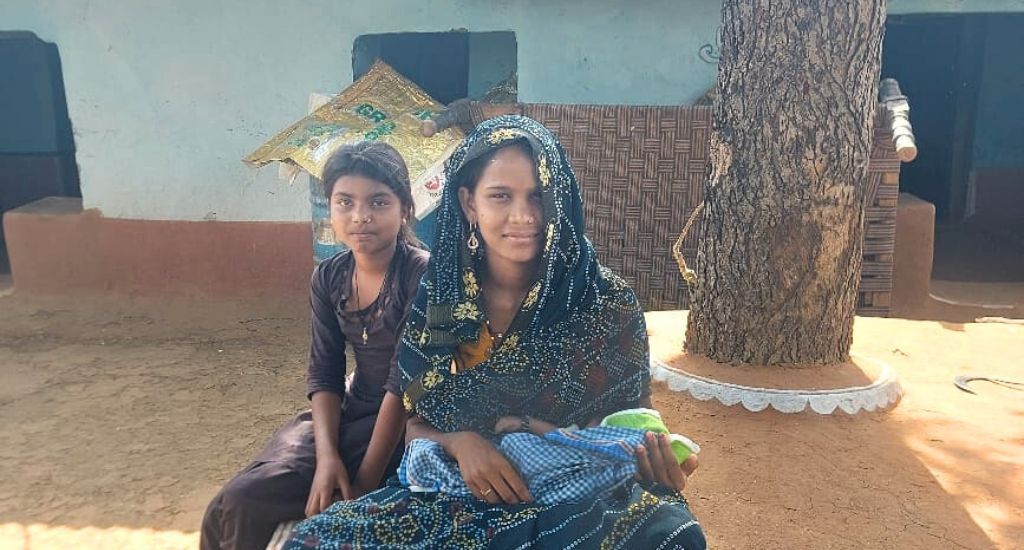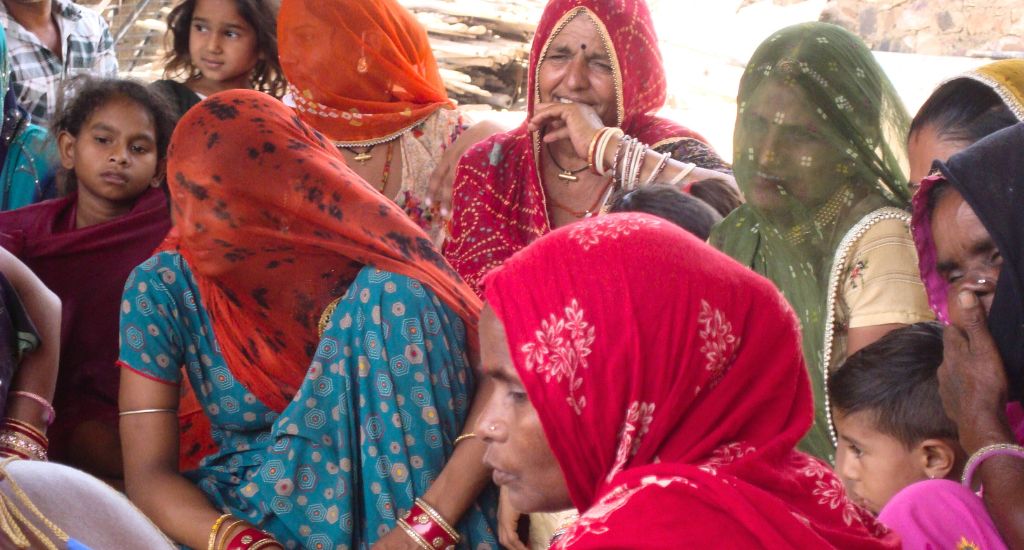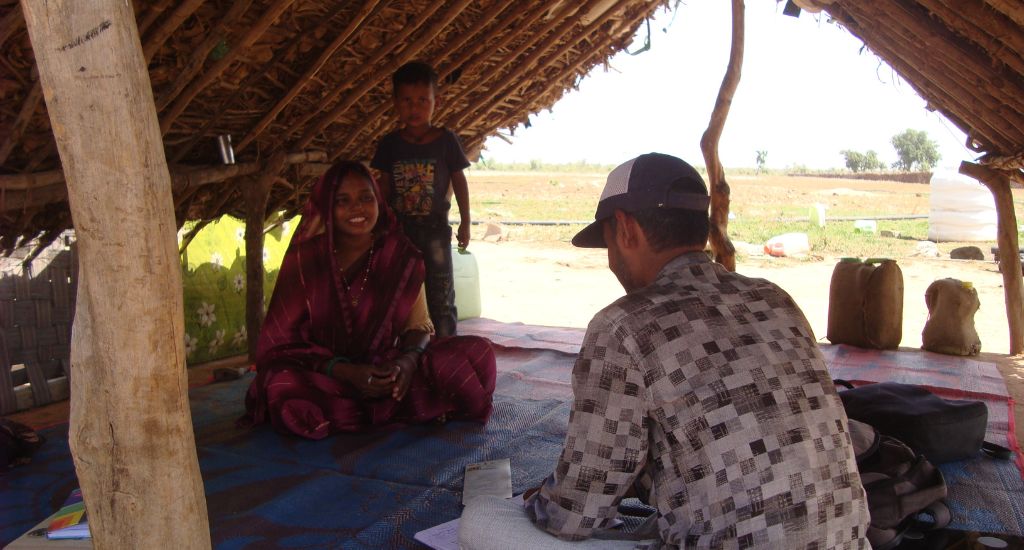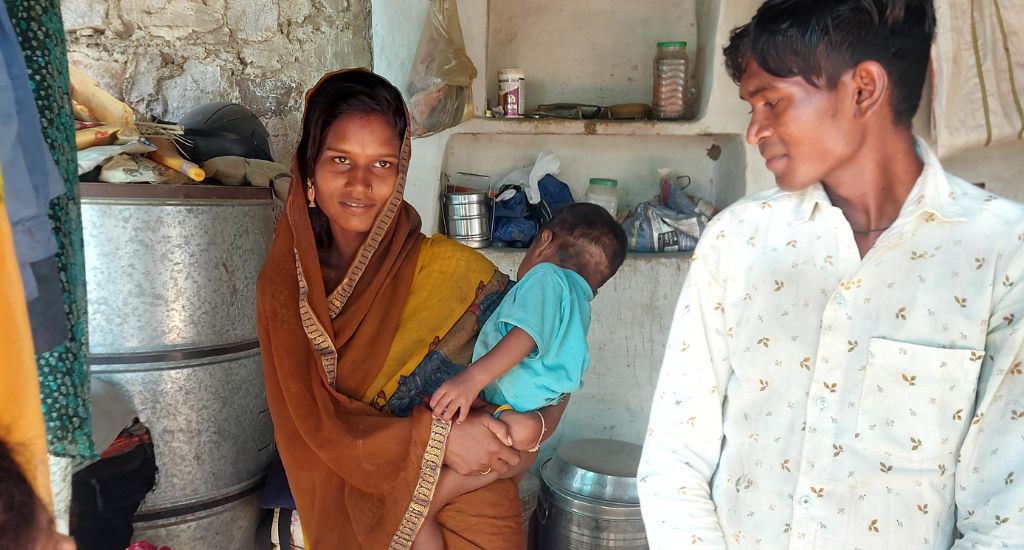
How pregnancies are getting healthier in rural Rajasthan
Cash transfers and direct conversations with health workers are bringing in dietary diversity among pregnant women and boosting their nutrition levels in underdeveloped districts of Rajasthan.

Cash transfers and direct conversations with health workers are bringing in dietary diversity among pregnant women and boosting their nutrition levels in underdeveloped districts of Rajasthan.
Bhojraj Sahariya of Nauhalya village in Baran district of Rajasthan is a bahubali of sorts. Strong – not in the muscular sense, but gritty enough to take a stand for his family. Bhojraj belongs to the Sahariya tribe – one of the most vulnerable communities of India.
He has had the courage to break societal nonchalance and support his pregnant wife, Kavita, who was not gaining weight during pregnancy. So he consulted the Accredited Social Health Activist (ASHA) workers and followed their instructions, coaxing Kavita to eat three meals a day until she delivered a healthy baby.
Shanti Devi, 48, a mother-in-law in the remote Gatta village, is a progressive woman too. She makes sure that her daughter-in-law Laxmi, 23, who is expecting her second child, gets the required healthy nutritional diet.
This change in mindset, now discernible across Rajasthan’s five tribal districts, is largely due to direct cash transfers into the accounts of would-be mothers, coupled with one-on-one conversations between pregnant mothers and frontline workers like poshan champions and anganwadi workers.
These trained community motivators – working under the RajPusht project, launched in 2020 to improve maternal outcomes – travel around Banswara, Baran, Dungarpur, Pratapgarh and Udaipur districts, busting myths.

They enhance awareness about proper maternal weight gain, nutrition intake and regular check-ups. The programme is being implemented by the state departments of Women and Child Development, and Medical, Health and Family Welfare.
The programme aims to reduce the prevalence of low birth weight and wasting by 5.5 percent between 2020 and 2024. It focuses on two complementary channels for improved maternal outcomes – changing the mindset with the help of ASHA and anganwadi workers, and direct cash transfers into the pregnant women’s bank accounts.
Also Read | Nursing the underserved to health in rural Rajasthan
Shanti Devi ensures that Laxmi is stress-free, well-fed and in good shape before she delivers her baby. Laxmi, who has studied till class IX, is aware that micro and macro-nutrients are necessary for a pregnancy diet. Gatta – a sparsely populated backward village where the family lives – is an unlikely place where pregnant women would ever be accorded such information.
Here the general belief is that pregnancy does not require any special care. Women are always the last to eat and often have to make do with leftovers. Deeply entrenched social biases against girl children also deprive them of nutritious food.
As per the National Health Family Survey-5 (2019-21), at least 59.3 percent of pregnant women aged between 15 and 49 years in Baran district are anaemic and at least 60.1 percent of all women aged between 15 and 49 years are anaemic.
When food is scarce, women forgo their portion willingly, leading to undernutrition and weakness.
Shanti Devi now thinks otherwise.
“Pregnant women should take nutritional meals at least four times a day,” she said, listing what should be included in the diet. “Otherwise how would the baby be healthy? Earlier we thought that papaya, pineapples, oranges and curd can cause miscarriage. Now we know the facts.”
Under the RajPusht programme, even second-time mothers are eligible for direct cash transfers into their bank accounts with conditions like early registration of pregnancy, at least two antenatal check-ups and institutional delivery.
At least 2,50,000 beneficiaries have received cash benefits so far.
Also Read | ‘India accounts for 9% of global maternal mortality’

“The direct cash transfers empower women to enact on the received advice. The whole idea is to shift the onus and power of nutrition decisions from government functionaries to the mother,” said M K Padmakumar, COO of IPE Global, an international development consultancy group that provides technical support to the project.
The RajPusht project has been formulated on the lines of Pradhan Mantri Matru Vandana Yojana (PMMVY), which was launched in 2017 for first-time mothers.
Recognising the success of PMMVY’s cash transfer scheme in improving maternal health, the state government initiated the Indira Gandhi Matritva Poshan Yojana (IGMPY) for the same cause.
As PMMVY is restricted to first-time mothers, 64 percent of pregnant women in Rajasthan could not receive the benefits. IGMPY, launched in 2020, included second-time mothers also. Rajasthan provides Rs 6,000 as per the NFHS guidelines to both first and second-time mothers, and an additional Rs 2,000 if a girl child is born.
The scheme is leading to positive outcomes. Families are realising the importance of having a fit mother and healthy baby for the well-being of their families.
“Now we know how much protein we should take. Fibre-rich legumes are a good source of vitamins, minerals and protein, and prevent constipation. Whole grains are also a good source of folic acid,” said Laxmi.

She learnt these from the poshan champion who visits women at home. She also visits the anganwadi centre and doesn’t miss her ante-natal check-ups.
“These check-ups ensure that any complication is not overlooked. I want a healthy baby. I also get Rs 1,000 per check-up. If the government is taking so much care, we can be a little more responsible,” Laxmi said.
Preliminary data shows that the number of women having knowledge of pregnancy and diet has increased from 19 percent to 57 percent. Also 51 percent women now use the received cash for dietary diversity, which was 31 percent earlier. This change is because of the long hours put in by the community influencers.
Also Read | Maternity homes provide safe haven to tribal women
“These poor communities use this cash to buy ghee and prepare nut-enriched laddoos (sweetmeats) to feed the mother. It’s a sea change,” said P C Rajendra, a poshan champion working among the Scheduled Caste and Scheduled Tribe communities.
“Initially they were hesitant, thinking I was just another uninterested government official. But after three visits, they started talking freely and following instructions. Community mobilisation is the key to unlocking taboos,” he said, explaining noticeable changes, especially among the Sahariya communities in Kishanganj and Shahbad blocks.
According to Rajendra, each gram panchayat comprising four villages and 12 designated anganwadi workers has a WhatsApp group that includes all mothers or their husbands if the women do not possess a phone. Informative videos are sent on a regular basis.
In line with popular blockbusters like Baahubali, some videos also honour husbands as bahubali men, when they take care of their pregnant wives, without puncturing their male egos. Bhojraj Sahariya is a case in point.
Also Read | How rural Rajasthani women break social shackles to earn freedom, respect from Africa tours
The lead image at the top shows Jyoti, a young mother, with her newborn baby at Jagdishpura village in the Kishanganj block of Baran district in Rajasthan (Photo courtesy IPE Global)
Rakhee Roytalukdar is a Jaipur-based independent journalist.